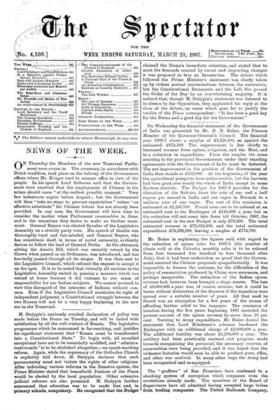Mr. Baker in explaining the figures said, with regard to
the reduction of opium sales for 1907-8 (the number of chests sold at the Calcutta monthly sales is to be reduced from four thousand five hundred to four thousand after July), that it had been undertaken as proof that the Govern- ment received the Chinese proposals sympathetically. It was impossible to foresee the outcome, for the difficulties of the policy of renunciation professed by China were enormous, and perhaps insuperable. The extinction of the Indian opium revenue had, however, been brought a stage nearer. The loss of 23,666,666 a year was, of course, serious; but it could be borne without dislocation of the finances if the transition were spread over a suitable number of years. All that need be feared was an absorption for a few years of the means of affording further relief to the taxpayer. The remission of taxation during the five years beginning 1903 exceeded the present amount of the opium revenue by more than 20 per cent. Turning to Army expenditure, Mr. Baker denied the statement that Lord Kitchener's schemes burdened the Exchequer with an additional charge of 22,000,000 a year. The additional liability was about 21,250,000 a year. The artillery had been practically rearmed and progress made towards reorganising the personnel, the necessary reserves of ammunition were being provided, and it was hoped that the ordnance factories would soon be able to produce guns, rifles, and other war ntaariei. In many other ways the Army had been reorganised and re-equipped.










































